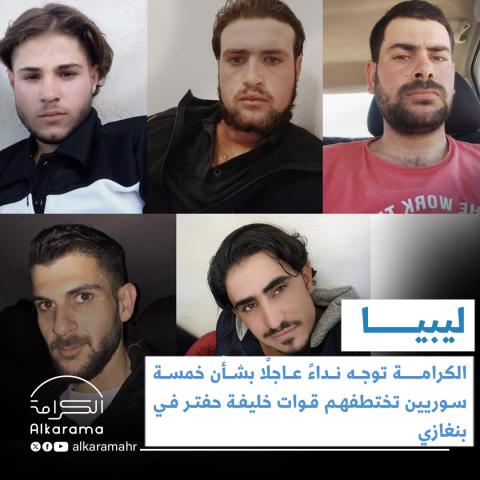
On 18 June 2025, Alkarama submitted an urgent appeal to the United Nations Working Group on Enforced or Involuntary Disappearances (WGEID), as well as to other UN mechanisms, concerning five Syrian citizens abducted by the internal security forces loyal to General Khalifa Haftar and his affiliates in Benghazi, eastern Libya, on 11 December 2024.
Alkarama also contacted the UN Special Rapporteur on the Human Rights of Migrants and the United Nations Support Mission in Libya (UNSMIL).
This marks the second initiative undertaken by Alkarama regarding the five missing Syrian nationals, whose families have been left without news or any form of contact since their abduction. Their last known whereabouts were at the Gharnada military prison.
The victims are: Ahmad Alothman, Ali Alsalkhadi, Anas Mohammed Ali Alsalkhadi, Khaled Alsalkhadi, and Osama Mohammed Sayfeddeen Alshadidi.
They are among the millions of Syrians who fled the war ravaging their country. They legally entered Libya with valid Syrian passports and regular entry visas. Settled in Benghazi, they worked and lived there in a stable manner.
Like many Syrians around the world, they expressed their joy after the departure of Bashar Al-Assad, fostering hope for a return to their homeland. It was in this context that they participated in a peaceful gathering, before being arrested without a warrant, in the middle of the street, by plainclothes security officers.
After their arrest, their families were left without news, plunged into anguish and uncertainty regarding their fate. It was only thanks to the testimony of a former co-detainee that they were finally able to learn of their detention at the Gharnada center, the deterioration of their health, and the acts of torture they endured. Accused without evidence of belonging to a terrorist group, they were forced, under torture, to sign confessions.
Alkarama's activism
On 18 February 2025, Alkarama had already filed a complaint with the UN Working Group on Arbitrary Detention (WGAD) regarding the case, initially highlighting the arbitrary nature of their detention from several angles.
Alkarama argued that their arrest was devoid of any legal basis: apprehended without a warrant, they were never informed of the reasons for their detention and remain deprived of any prospect of a trial. It was emphasised that this deprivation of liberty directly stems from the exercise of fundamental rights, namely freedom of opinion and freedom of peaceful assembly, as guaranteed by the International Covenant on Civil and Political Rights.
Moreover, the victims were denied any legal assistance and never had access to an independent body to challenge the legality of their detention, in manifest violation of their right to a fair trial. Finally, this detention is based on a discriminatory basis, as their mere Syrian origin led the Benghazi authorities to wrongfully associate them with a terrorist group.
For all these reasons, Alkarama urged the Working Group on Enforced or Involuntary Disappearances to initiate dialogue with the Libyan authorities in order to obtain official information on the fate and whereabouts of the five missing individuals, and to demand their immediate release and full respect for their fundamental rights.
